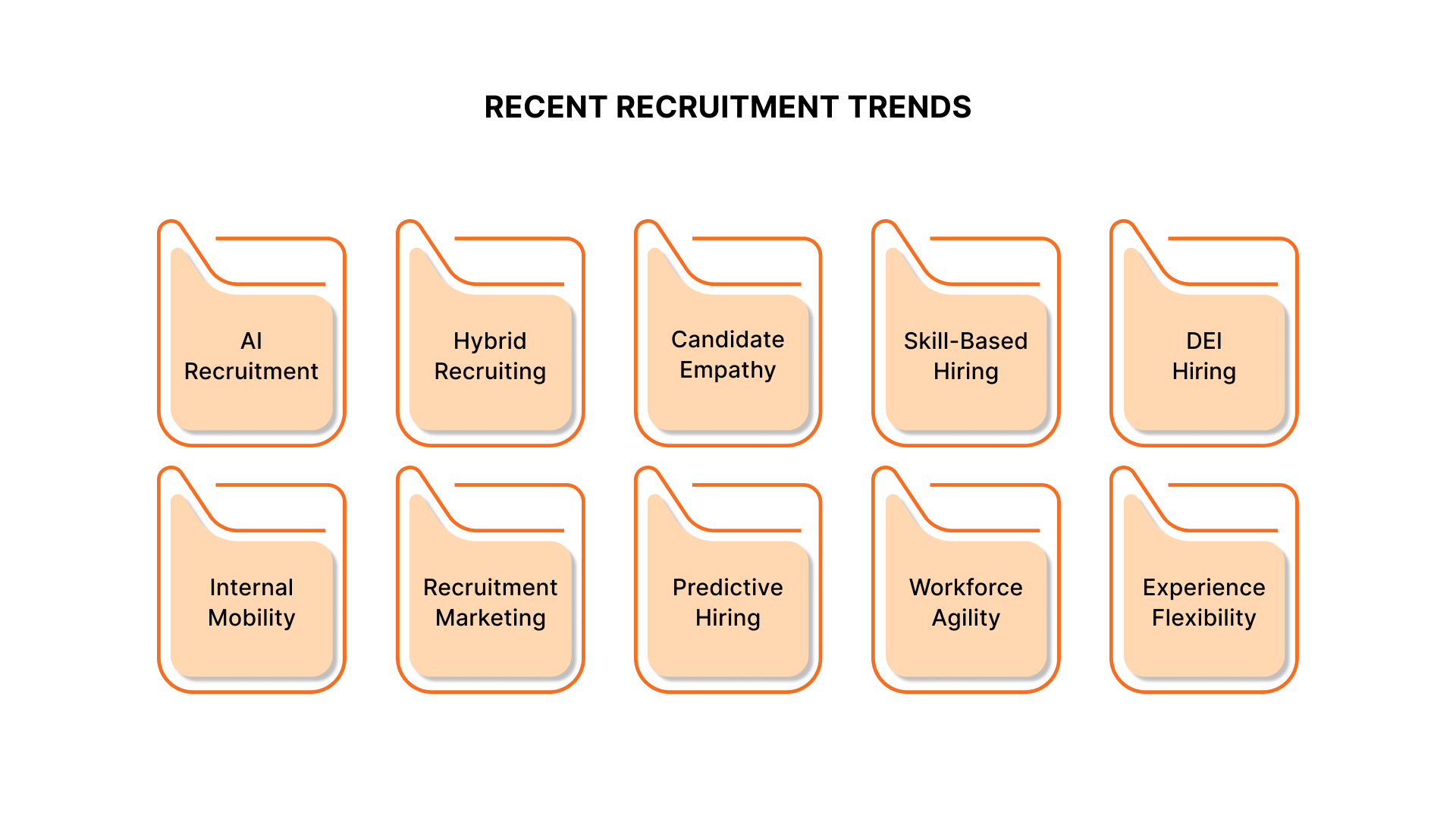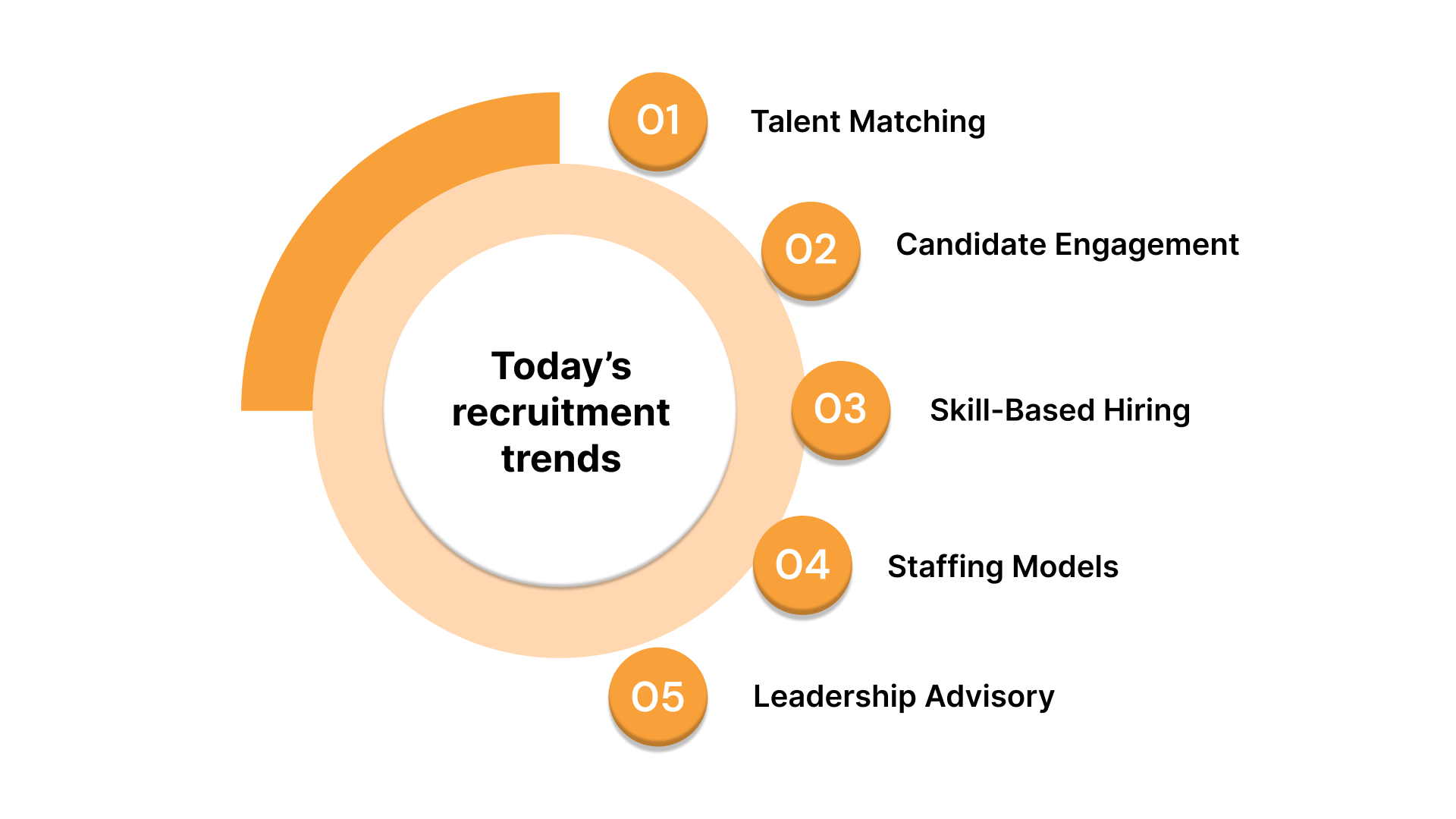In 2026, recruitment is changing fast due to new technology, different worker expectations, and the need to be quick and flexible when hiring. As businesses across India and the globe adapt to a post-pandemic world marked by digital acceleration and hybrid work models, talent acquisition has evolved from a transactional process into a strategic function.
Companies that prioritise these elements are better positioned to attract high-quality talent, improve hiring outcomes, and remain competitive in a constantly changing market.
In this blog, discover the recent recruitment trends and how innovation, technology integration, and a candidate-centric approach have become essential pillars of effective recruitment.
Key Takeaways:
- AI, automation, and predictive analytics are transforming recruitment with faster, data-driven, and more inclusive processes.
- Virtual and hybrid hiring models dominate, offering flexibility, efficiency, and access to a geographically diverse talent pool.
- Skill-based hiring and DEI integration are reshaping evaluation methods, widening access to diverse, capable candidates.
- Internal mobility and workforce agility are priorities, helping companies adapt quickly and retain valuable in-house talent.
How Trends in Recruitment Are Reshaping Hiring in 2026
Recruitment in 2026 is evolving into a data-driven function closely aligned with business strategy. Recent trends in recruitment are shifting the focus from filling vacancies to building future-ready teams with precision and speed.
Hiring cycles are shorter, candidate engagement is more personalised, and decisions are increasingly backed by analytics rather than intuition. Technology is enabling consistency, scalability, and inclusion at every stage of recruitment, while employer branding and candidate experience now play a central role in attracting top talent. These shifts are empowering organisations to compete more effectively in a talent-driven market while enhancing long-term workforce quality.
10 Recent Recruitment Trends for 2026

In 2026, recruitment keeps changing because of new technologies, shifting worker patterns, and the need for more inclusivity and flexibility.
Employers are not only rethinking how they attract candidates, but also how they evaluate, engage, and retain them throughout the hiring lifecycle.
Below are 10 recent recruitment trends that are reshaping recruitment in 2026.
1. AI and Automation Transforming Recruitment
Artificial Intelligence and automation, integrated into recruitment processes, help companies manage the demands of scale, speed, and precision. These technologies are redefining how recruiters manage high application volumes, engage with talent, and make data-informed hiring decisions.
Key applications include:
- AI-powered CV screening: Algorithms are used to assess candidate profiles against job descriptions, ranking applicants based on skills, experience, and relevance, saving hours of manual review time.
- Automated candidate-job matching: Intelligent systems analyse both structured and unstructured data to suggest the most suitable candidates for each role, improving match accuracy and reducing mismatch risks.
- Interview automation tools: Platforms facilitate asynchronous video interviews, allowing candidates to record responses at their convenience while AI evaluates communication skills, tone, and behavioural cues.
While AI significantly reduces administrative load and time to hire, with some cases showing a 22% reduction in time to fill, its effectiveness depends on careful oversight. With responsible implementation, it also helps minimise human bias, promoting more inclusive hiring outcomes.
2. Virtual and Hybrid Recruiting Become the Norm
As remote and hybrid work models become more deeply embedded in company structures, recruitment practices have evolved to support a geographically dispersed talent pool.
Key developments include:
- Virtual interviews and onboarding: Companies are using secure video platforms and digital tools for virtual interviews and onboarding, saving time and costs while expanding talent access beyond major cities like Bengaluru, Mumbai, and Delhi NCR.
- Hybrid work models influencing recruitment: With remote and hybrid work becoming common, candidates now prioritise work-life balance and location flexibility. Employers who clearly share their hybrid policies attract more candidates and boost offer acceptance.
Virtual hiring strategies also help companies better adapt to evolving workplace norms while maintaining a professional and consistent candidate experience.
Read More: Top Secure Practices for Remote Hiring: Everything You Must Know
Struggling to find the right talent? V3 Staffing’s expert recruiters and curated talent pools can help you source top candidates faster and more effectively whether you’re hiring remotely or scaling hybrid teams across India.
3. Candidate Experience and Empathy Take Centre Stage
Recruitment is now about building trust and long-term relationships, with employers focusing on a positive, transparent, and empathetic candidate experience at every hiring stage.
Notable practices include:
- Personalised candidate journeys: AI-powered chatbots and asynchronous video interviews are helping create customised interactions at scale. These tools allow candidates to receive instant updates, ask questions, and complete interviews at their convenience, improving engagement and reducing drop-offs.
- Empathy in communication: Recruiters are trained to respond empathetically, especially during rejections or delays, preventing the “vanishing recruiter” effect and boosting the employer brand.
An empathetic recruitment approach not only improves candidate satisfaction but also strengthens a company’s reputation in competitive talent markets.
4. Skill-Based Hiring Over Degree Requirements
In 2026, companies are shifting away from traditional qualification-based hiring in favour of evaluating candidates based on practical skills, job readiness, and real-world competencies. This trend reflects a broader move towards inclusive and outcome-oriented recruitment.
Key developments in this area include:
- Emphasis on competencies and certifications: Employers now prioritise hands-on skills, certifications, and proven abilities, especially in tech and remote-first roles. Candidates with non-traditional backgrounds but strong portfolios or credentials are gaining greater visibility.
- Broader and more diverse talent pools: By moving beyond rigid degree requirements, companies open opportunities to underrepresented groups, self-taught professionals, and career-switchers. This approach promotes greater diversity and inclusivity while aligning hiring with the actual demands of the role.
Skill-based hiring enables recruiters to focus on potential, adaptability, and performance, ultimately leading to stronger teams and more equitable hiring outcomes.
Also Read: Recruiting for Cultural Fit vs. Skills: Striking the Right Balance
5. Diversity, Equity, and Inclusion (DEI) Embedded in Hiring
Diversity, Equity, and Inclusion are not standalone initiatives, they are deeply integrated into the recruitment strategies of forward-looking companies. Companies now recognise that a diverse workforce brings measurable value, from broader innovation to stronger employee engagement.
Key approaches include:
- Inclusive language and representation: Job descriptions are being rewritten to eliminate gendered or biased language, and interview panels are increasingly diverse in terms of background, gender, and role level. This creates a more welcoming and equitable experience for candidates across demographics.
- Accountability at the leadership level: DEI is no longer just a talking point, it is tied to tangible business outcomes. Companies are setting measurable diversity goals and linking them to executive KPIs and compensation, reinforcing long-term commitment.
By embedding DEI into every stage of recruitment, businesses not only strengthen their talent pipelines but also build more resilient and socially responsible companies.
Looking to reduce attrition and future-proof your teams? V3 Staffing supports internal mobility and succession planning through Executive Search and upskilling advisory helping you build future leaders from within.
6. Internal Mobility and Upskilling as Strategic Priorities
Talent retention is as critical as talent acquisition. Companies are placing strategic emphasis on internal mobility and upskilling to build resilient workforces, reduce attrition, and address evolving skill requirements from within.
Noteworthy strategies include:
- AI-driven internal job matching: Intelligent platforms are being deployed to recommend internal roles to existing employees based on their current skills, interests, and performance data. This helps align individual aspirations with company needs, encouraging long-term growth.
- Structured career pathing and learning programmes: Employers are investing in targeted learning and development (L&D) initiatives that support career progression, particularly in technical and leadership roles. This not only improves employee engagement but also reduces dependency on external hiring.
By focusing on employee growth and mobility, companies can retain institutional knowledge, fill hard-to-hire roles more effectively, and cultivate a more motivated, future-ready workforce.
Also Read: Why Upskilling and Reskilling Are Essential for Recruitment Success
7. Recruitment Marketing and Employer Branding
Recruitment is no longer confined to job postings and interviews, it has become a continuous marketing function. Companies are adopting marketing methodologies to attract, engage, and convert top talent, particularly in competitive sectors such as IT, BFSI, and engineering.
Key focus areas include:
- Adopting marketing funnels for hiring: Recruiters are applying targeted content strategies ranging from awareness-stage social media posts to decision-stage email nurturing to guide candidates through the hiring journey. These funnels help build stronger connections before formal applications even begin.
- Establishing an authentic employer brand: Candidates today seek transparency and alignment with company values. By showcasing employee testimonials, diversity initiatives, career development opportunities, and work culture, employers can create a genuine and attractive brand image that resonates with high-quality talent.
A strong employer brand not only improves attraction and engagement but also plays a vital role in improving retention and offering acceptance rates across regions like Bengaluru, Chennai, and Pune.
8. Advanced Data Analytics and Predictive Hiring
Recruitment in 2026 is increasingly guided by data. Employers are using analytics not only to understand past hiring outcomes but also to anticipate future performance and retention. Predictive hiring models have become an essential tool for talent acquisition teams seeking greater accuracy and accountability in decision-making.
Key trends in this space include:
- Utilising historical and real-time hiring data: Companies are analysing past recruitment metrics such as time-to-fill, candidate source effectiveness, and first-year performance, to build stronger forecasting models. Real-time dashboards also support faster course correction during live hiring campaigns.
- Improving quality-of-hire with predictive analytics: By examining patterns in candidate assessments, behavioural traits, and post-hire outcomes, recruiters can better identify who is likely to succeed and stay in the role. This reduces attrition and increases long-term value from each hire.
Data-driven recruitment not only supports more informed hiring decisions but also promotes alignment between HR teams and business objectives across delivery hubs.
Read More: How Predictive Analytics is Revolutionising Talent Acquisition
9. Flexibility and Agility in Workforce Planning
In 2026, workforce flexibility is essential. Companies are adopting adaptable hiring strategies to respond swiftly to market changes, regulatory shifts, and project demands. This agility is especially important in India’s key business hubs, where growth and talent needs vary widely.
Key approaches include:
- Greater reliance on temporary and contract staffing: Companies are increasingly turning to contingent talent to meet short-term project needs, seasonal peaks, or budget constraints. Temporary staffing models provide scalability without the long-term commitment of permanent headcount.
- Responsive recruitment planning: Hiring strategies are being adjusted in real time based on evolving business priorities. Whether scaling up a tech team in Bengaluru or navigating cost controls in Chennai, flexibility in recruitment allows companies to remain competitive while maintaining operational efficiency.
Agile workforce planning ensures that businesses can remain resilient, responsive, and focused regardless of market volatility or internal change.
Hiring needs are evolving. Is your recruitment partner evolving too? V3 Staffing is a leading workforce solutions provider in India. With a clear understanding of the industry and urgent hiring needs, we provide quick, accurate, and scalable solutions customised to help your company grow.
10. Falling Experience and Tenure Requirements
Modern hiring strategies are moving away from rigid experience thresholds, placing greater emphasis on potential, adaptability, and cultural alignment. This shift is enabling companies to tap into more diverse and dynamic talent pools, particularly those with non-traditional backgrounds.
Key applications include:
- Hiring based on potential over tenure: Recruiters are focusing on learning agility, problem-solving capabilities, and growth mindset rather than simply measuring years of experience.
- Recognition of transferable skills: Candidates from adjacent industries or unconventional career paths are being evaluated for how well their skills can be applied to new roles.
While this evolution improves access to untapped talent, it also challenges long-held recruitment norms. Companies must equip hiring teams with structured evaluation tools to ensure quality and consistency in a less experience-centric model.
How V3 Staffing Improves Recruitment for Modern Workforces
As recruitment evolves rapidly in 2026, V3 Staffing stands out as a trusted partner for companies seeking adaptable, future-ready hiring solutions across India. With a strong presence in core delivery hubs: Hyderabad, Bengaluru, Chennai, Pune, Delhi NCR, and Mumbai, V3 Staffing is well-positioned to address the evolving workforce needs of both Indian and international companies operating domestically.
Here’s how V3 Staffing aligns with today’s recruitment trends:

- AI-Powered Talent Matching: V3 Staffing utilises advanced sourcing tools and automated screening methods to improve role-to-candidate alignment particularly valuable in niche and high-volume hiring scenarios.
- Candidate-Centric Approach: By combining high-touch delivery with technology-enabled tracking, V3 ensures consistent candidate engagement, improved offer-to-join ratios, and a stronger employer brand.
- Skill-Based and Diversity-Focused Hiring: V3’s domain-specific recruiters focus on capabilities rather than credentials, helping clients tap into more diverse and inclusive talent pools across metros and Tier-II cities.
- Flexible Staffing Models: Whether through Temporary Staffing, Permanent Recruitment, IT Staffing, or RPO, V3 offers scalable solutions that support agility, workforce planning, and cost-effective growth.
- Leadership Hiring & Internal Mobility Advisory: Through its Executive Search service, V3 supports strategic leadership hiring while advising clients on building reliable internal pipelines.
V3 Staffing brings a blend of industry expertise, regional depth, and technology-driven execution that aligns with the challenges and trends shaping recruitment in 2026. Our approach ensures a deep understanding of Indian standards and local talent trends.
Conclusion
Staying ahead of recent recruitment trends is essential for companies looking to attract, engage, and retain high-quality talent in today’s evolving business environment. From AI-powered hiring and virtual interviews to skill-based assessments and inclusive hiring practices, each trend reflects a shift towards smarter, more human-focused recruitment.
V3 Staffing supports this transition by combining domain expertise with tech-enabled delivery. Whether your business is navigating new workforce models, expanding across India, or addressing niche hiring challenges, our India-first approach ensures reliable and scalable hiring outcomes.
Contact us to align your talent strategy with the most relevant recruitment trends of 2026 through a trusted partnership with V3 Staffing.
FAQs
Q. What are the recruitment trends for 2026?
A. Recruitment in 2026 emphasises AI and automation, virtual/hybrid hiring, skill-based and inclusive hiring, internal mobility, data-driven decisions, and agile workforce planning to attract and retain diverse, high-quality talent efficiently.
Q. How is AI changing recruitment in 2026?
A. AI simplifies recruitment by automating CV screening, candidate-job matching, and interview evaluation, enabling faster, unbiased, and data-informed hiring decisions.
Q. Why is skill-based hiring important now?
A. Skill-based hiring focuses on practical abilities over degrees, promoting inclusivity, tapping diverse talent pools, and better aligning candidates’ capabilities with job needs.
Q. What are the three types of recruitment?
A. The three main types are internal recruitment, which fills roles from within the company; external recruitment, which sources candidates from outside; and outsourced recruitment, where third-party services manage the hiring process.
Q. What are the 7 stages of recruitment?
A. The stages include identifying hiring needs, creating job descriptions, sourcing candidates, screening applications, conducting interviews, selecting the right candidate, and onboarding them into the company.


